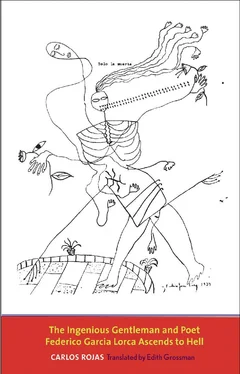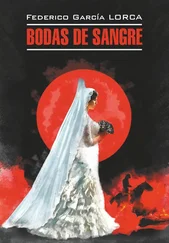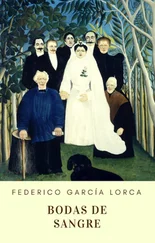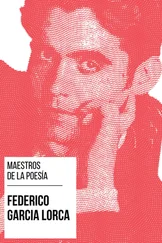“Exactly right!” the intruder corroborated. “The coincidence cannot be clearer!”
“The coincidence? What are you talking about now?”
“Everything you told me is the same thing I often imagined in my house in America. In other words, my fate in Granada if instinct hadn’t taken me off the Andalucía express that afternoon. It began as a game and turned into a kind of obsession. I even understand your reticence in refusing to comment on certain passages of the farce. I didn’t want to confess any of that to my own wife. Still, one day I’m going to write it, just for myself. When one has refused the Prize of the Dynamiter, flatly and unhesitatingly, one can allow oneself moderate pleasures.”
“Enough! Enough! I’m not going to tolerate this parody of my tragedy from you!”
“How would you stop it, wretch? When did dreams ever govern the dreamer?” He paused and smiled, shrugging his shoulders. “You wouldn’t try to destroy me after absolving your imaginary killers?”
“I’m not trying anything. I want only to be left alone. Alone with my memories, if I can’t free myself or they don’t want to free me from my sleeplessness.”
“I’ll go, I’ll go,” the apparition yawned. “Dreams, like the flesh, end in tedium. It’s time to wake and perhaps write about our dispute. Didn’t you ever think about an interminable autobiography, infinite, really, where you told not only all we were but also all we could have been in all their variations? It would be the only appropriate kind for any life. Even in ours the two of us would fit, and who knows what extended multitude of men in our image and likeness”—he was shaking off his drowsiness and rubbing his eyes with sharp knuckles. “All together, like dice thrown from the same cup. You know, son, un coup de dé jamais n’abolira l’hasard. The combinations of the fortuitous are infinite, in all the avatars of identity and their Ortegan consequences. Here, for example, are you and I like a pair of facing mirrors, in the middle of the same desert, though each comes from a different time. You, arrested in my youth and on the day I didn’t take the train going to Granada. I, shackled in my present old age.”
“And the desert?”
“I call my dream the desert and you say it’s hell. Perhaps we’re both right.”
The old man was becoming blurred, as if someone were erasing him with a fingertip, taking away volume, outlines, and profile. Eventually he disappeared without leaving a trace or vestige in the theater or his seat. Alone again, he looked around him. The stage became a dark emptiness, the proscenium open to infinity, like the mouth of a tunnel excavated in the middle of the firmament. He heard or thought he had imagined the sound of footsteps in the vicinity of the corridor and the alabaster lights. Immediately he became aware that he was isolated and abandoned or abandoned and isolated on that spiral, where the dead were blind or invisible to one another. His doubles, the phantoms, having disappeared, the notion of his insignificance oppressed him. Eternity was the greatest of sarcasms, an illogicality more absurd than perishable life. In this untransferable theater before his trial, he was nothing but a spectator of his past in an endless succession of shades condemned to the same wakefulness. Perhaps the first of them, his most distant ancestor, saw on the stage memories of a recent time he had experienced when still a gorilla or an amphibious fish, with the eyes of a man, in the dark jungles of the beginning of the world.
The last of his aged replicas, the one living in the United States with the woman in whose eyes and behind the gates of Gomorrah Melibea and Albertine had met, told him his martyrdom in Granada was only a dream of his, as were Ruiz Alonso, the Rosales family’s house, the yellow bedspread, the piano, the Sacred Heart, the translations by Salinas, the window facing Calle de Angulo, the Rosales family themselves, and Valdés’s interrogation. Of the two nonsensical grotesques in their hypothetical old ages, the one with white hair and dark traces seemed more hateful. He imagined him in an America very different from the one he had known. The one of the unemployed, the beggars, the supplicants in lines for watered soup, the one of despair, of prostitutes, of suicides. The America that he predicted would be devoured one day by hissing cobras climbing like lianas to the highest terraces. ( Brother, can you spare a dime? The one of the multitude that urinates, of the multitude that vomits, of the blacks disguised as janitors, the one of the king of Harlem tearing out the eyes of crocodiles and banging the hindquarters of monkeys with a spoon, of narrow defiles of masonry and brick under an empty sky, of the moon buried in the Jewish cemetery.) All of that America at the edge of the apocalypse, waiting for a resurrected Bosch to paint it before the fall. (“ … and Dalí still very young, not dressed as a janitor like the king of Harlem, whom he would take many years to meet, but as a soldier, the newest replacement, when his brush was still imperfect and he struggled to imitate everybody, from Picasso, naturally, to Chagall, passing through Matisse, telling me in his deep voice and Ampurdanese accent: Each painter responds to his environment, just as each child is nourished by the juices and salts and potash and will-o’-the-wisps and lotteries and cellos that constitute the maternal womb. Here in Cadaqués, I can’t paint like Bosch in Flanders. And I, giving him almost inadvertently the advice that would transform the little soldier and amateurish dauber into one of the most original painters of this insane, suicidal century: That’s precisely why you should keep painting like Bosch. You could spend your whole life in the undertaking, but you’ll end up discovering the great artist you have hidden under your blood, in your unconscious. ) That America, yes, indelible and magnificent in its vast tragedy, stretching from coast to coast and from ocean to ocean with its pus and its ringworm, its lice and its scabs, transformed into the other America of gardens with laurels, bedrooms with pale ironed curtains, and the Swedish cultural attaché announcing the granting of the Dynamiter’s Prize in Literature.
He began to pity the simpleton who attempted to represent him in an old age snatched away by bullets. He imagined living in another unspeakable hell where he would be incapable of writing because he had lost his identity. A hell that ironically, paradoxically, was not the real one, the spiral of wakefulness, but the one he had feared so much in life: the renunciation of all he had been on earth. As on so many other occasions, he thought again about the conversation with Alberti and María Teresa León, at the foot of the Maqueda Castle, while the three of them in their incredible, vulnerable youth, appeared on stage where they again experienced the teasel and the merlons. Alberti confessed his uncertainty when it was time to choose between two horrors, ignorance of his own fate in death or its unending eternity. He immediately replied that his panic had another name: the loss of his self, the being who had never been, in no-man’s land. If the destiny of the second apparition had been realized, a very conceivable fate beginning with a fact that only seemed insignificant, his giving up the trip to Granada in time, he would still be living in an America different from the one in his Poet in New York , but at the same time he would be totally distinct from the one who had written that book or, in fact, any other of his more typical works. Stripped of his identity, as you divest yourself of an old, shoddily made suit, he would dream occasionally and always in vain of death at the hands of other men, which in Granada had fulfilled the doom anticipated in some of his plays and poems: in one of the two songs of the horseman, in “Ballad of the One Summoned,” in “Sleepwalking Ballad,” in “Surprise,” in The Public , and in Blood Wedding. An execution that confirmed not only the fate written and described in his own hand but also the universal dimension of his renown as poet, prophet, and martyr.
Читать дальше












